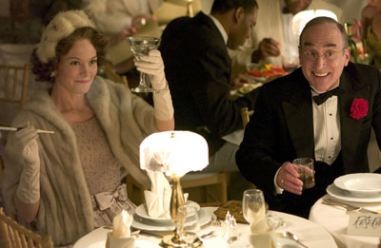Tinseltown exposé

Television cemented stardom in the 1950s for many celebrities of radio, vaudeville and motion pictures—Lucille Ball, Milton Berle, even Alfred Hitchcock. The first TV star created by the infant medium was George Reeves. A capable actor with a Roman jaw, cast as Stuart Tarleton in Gone With the Wind (1939) and consigned to mostly forgotten pictures in the late 1940s, Reeves was offered the lead in a syndicated television program that was without sponsorship until two years after filming was completed. Take the money, his agent advised; nobody will ever see the silly thing anyway.
It was a sensible argument that could not have proved more wrong. Adventures of Superman (1951-1958) went through the roof. Five decades later, the original 104 episodes enjoy healthy sales in DVD sets from Warner Home Video. Lamentably, its only surviving actors, Jack Larson (Jimmy Olsen) and Noel Neill (Lois Lane), haven’t received a penny in royalties in decades.
The case with Reeves was sadder. Typecasting was even crueler 50 years ago than it is today. Most of Reeves’s supporting performance in one of his few A-pictures, From Here to Eternity (1953), landed on the cutting-room floor when preview audiences couldn’t shake the impression that Burt Lancaster’s character was chatting with Superman. Reeves’s curse was not that he was a poor actor. Rather, he was the perfect television actor—affable and endearing in America’s dens—at a time when movies were still the gold standard for fame-hungry performers without Clark Gable’s draw. And so, when Reeves was found sprawled on his bed with a bullet in his head in June 1959, many—including the Los Angeles police—concluded that it was a suicide, probably stemming from the actor’s depression at having arrived at his career’s dead end.
From the beginning, however, there were doubts, based on circumstantial evidence at the scene and partly driven by suspicions of foul play voiced by Reeves’s mother, Helen Bessolo. She hired a private detective to investigate the people and circumstances involved in her son’s last days, and that is the story that Hollywoodland aims to tell.
It is a complex tale to translate onto the screen, and not only for the reasons just mentioned. For one thing, Reeves (played by Ben Affleck) had long been the paramour of Toni Mannix (Diane Lane), wife of MGM vice president Eddie Mannix (Bob Hoskins). Jealousy was no likely motive for suspected murder: Mannix himself had a Japanese mistress, with whom he, Toni and Reeves sometimes dined together, very much in public. In the last months of Reeves’s life, however, he took yet another lover, Leonore Lemmon (Robin Tunney), who, the movie suggests, was careless with firearms.
The movie further suggests, reasonably, that Toni Mannix was distraught by Reeves’s betrayal and, more tendentiously, that Eddie Mannix may have had him killed. The movie dramatizes yet another scenario: the actor perhaps took his own life after all. Based on real-life people and events, the movie cannot untie the knot around the death of George Reeves.
A film without clear resolution need not fail: witness Kurosawa’s Rashomon (1950). Hollywoodland stumbles for other reasons. For one thing, it folds the actor’s story into that of Louis Simo (Adrien Brody), the investigator hired by Reeves’s mother, interweaving the two plots about men with professional and domestic troubles. The primary story is Simo’s, with repeated flashbacks to Reeves. Therein lies a fundamental flaw. Screenwriter Paul Bernbaum and director Allen Coulter committed themselves to interlaminating two narratives: one of a crime, the other of its investigation. Dramatically speaking, the movie is never properly balanced. Neither protagonist is fully fleshed out.
Brody, who won the Academy Award for Best Actor for The Pianist, has to carry the principal exposition with the duller, less attractive character. Affleck, whose only Oscar to date is for a screenplay (Good Will Hunting, co-written with Matt Damon), draws the smaller part, which is inherently more charming and more interesting. Excellent actors like Lane and Hoskins, predictably good in their roles, get lost in the jumbled attempt to tell the already convoluted story—in probably the least straightforward way—of people who emerge as hardly more than cardboard noir figures.
That is a pity, because once there really was an actor named George Reeves who lost his heart to two women and lost his life for reasons we’ll never know. When the audience occasionally returns with Simo to his home, where his little boy is traumatized—as, in 1959, many children were—by front-page headlines of the ugly death of Superman, I wished we could stay with the kid’s story. It, too, is a story of illusions dashed—though it’s superior to either of the two on which Hollywoodland concentrates. The detective and the actor are driven by ambition, lust and money. The child’s grief is motivated by love.




